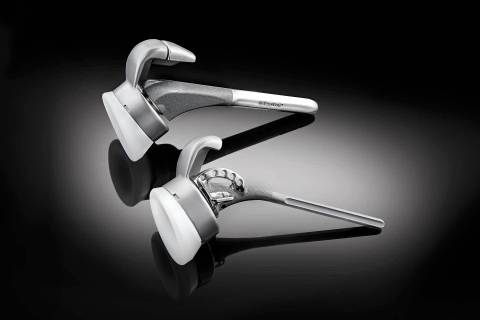March 29, 2021
The Equinoxe Humeral Augmented Tray is the first implant of its kind. It replaces the greater tuberosity, a part of the shoulder that may be absent or deficient, fractured and/or reabsorbed due to disease.
The HAT was designed to be used in combination with the Equinoxe Platform Shoulder System for reverse procedures and was designed to help improve joint mechanics and stability for patients with proximal humeral bone loss. This unique implant can also be used with an extension for more severe proximal bone loss cases.
The first surgeries with the Humeral Augmented Tray were performed last week in Florida by Bradley Schoch, MD, of the Mayo Clinic in Jacksonville, and design team surgeon Howard Routman, DO, of JFK Medical Center in Lantana.
“The patients who need this implant have either previously undergone surgeries which failed, suffered fractures of the humeral head, or have congenital abnormalities that leave them with deficient tuberosities, which prevent them from doing what they want,” said Dr. Routman. “This implant allows them to return to what they love, and I feel very honored to have been part of the design team and one of the first to use this prosthesis.”
“We are very pleased to launch the Humeral Augmented Tray and excited to receive feedback from our surgeon colleagues and see its impact on patients. Its addition to the Equinoxe Shoulder family allows us to reach even more patients,” said Vice President of Extremities Chris Roche.
The design team includes Dr. Routman, Thomas Wright, MD, of the University of Florida in Gainesville, Fla.; Pierre-Henri Flurin, MD, of Surgical Clinic of Bordeaux in Merginac, France; Matthew Hansen, MD, of Banner Gateway Medical Center in Gilbert, Ariz.; Raymond Klug, MD, of Lakewood Regional Medical Center in Lakewood, Calif.; and Joseph D. Zuckerman, MD, of NYU Langone Orthopedic Hospital in New York City.
